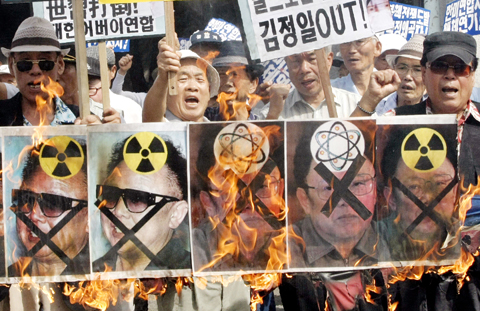North Korea announced yesterday that its process of enriching uranium is nearly complete, giving it a new way to make nuclear bombs as the US and regional powers discuss how to bring Pyongyang back to disarmament talks.
The move raises concerns that North Korea may soon produce uranium-based bombs in addition to those made from plutonium.
The US, China, Japan, Russia and South Korea had been trying for years to persuade North Korea to dismantle its plutonium-based nuclear program, which experts say has yielded enough weaponized plutonium for at least half a dozen bombs, in exchange for much-needed aid.

PHOTO: AP
After hashing out a 2007 disarmament-for-aid deal, North Korea walked away from those talks earlier this year in anger over the rising international outcry over a rocket launch widely condemned as a disguised test of its long-range missile technology.
Uranium can be enriched in relatively inconspicuous, underground factories, and could provide North Korea with an easier way to build nuclear bombs, experts in the US and at South Korea’s Institute of Nuclear Nonproliferation and Control say.
Uranium-based bombs may also work without requiring test explosions, like the two carried out by North Korea in May and in 2006 for plutonium-based weapons.
Washington’s special envoy on North Korea, Stephen Bosworth, said any nuclear development in North Korea was a matter of concern.
“We confirm the necessity to maintain a coordinated position and the need for a complete denuclearization of the Korean Peninsula,” he said in Beijing during an Asian trip to discuss North Korea with counterparts in China, South Korea and Japan.
The US had long suspected that the North also had a covert uranium enrichment program, which would give it a second source of nuclear material. North Korea for years denied the claim but revealed in June that it was prepared to start enriching uranium.
“Experimental uranium enrichment has successfully been conducted to enter into completion phase,” North Korea said in a letter to the UN Security Council carried yesterday by its official Korean Central News Agency.
Verifying North Korea’s claim on uranium enrichment would not be easy, South Korean Defense Ministry spokesman Won Tae-jae said, adding that it could be a negotiating tactic.
However, the announcement suggests the regime has made progress in research and development in its uranium program in a small pilot factory, said Lee Choon-geun of South Korea’s state-funded Science and Technology Policy Institute. Still, he said, it could take at least five years to build a uranium-based bomb.
North Korea also said yesterday it was continuing to weaponize plutonium. The 2007 deal had called for disabling its reactor.
The tough talk indicated North Korea’s impatience with the US as Washington continues to pursue sanctions against the North despite a series of overtures from it in recent weeks.
“We are prepared for both dialogue and sanctions,” the North said in the letter to the Security Council. If some permanent council members “wish to put sanctions first before dialogue, we would respond with bolstering our nuclear deterrence first before we meet them in a dialogue,” it said.

Authorities have detained three former Taiwan Semiconductor Manufacturing Co (TMSC, 台積電) employees on suspicion of compromising classified technology used in making 2-nanometer chips, the Taiwan High Prosecutors’ Office said yesterday. Prosecutors are holding a former TSMC engineer surnamed Chen (陳) and two recently sacked TSMC engineers, including one person surnamed Wu (吳) in detention with restricted communication, following an investigation launched on July 25, a statement said. The announcement came a day after Nikkei Asia reported on the technology theft in an exclusive story, saying TSMC had fired two workers for contravening data rules on advanced chipmaking technology. Two-nanometer wafers are the most

DEFENSE: The first set of three NASAMS that were previously purchased is expected to be delivered by the end of this year and deployed near the capital, sources said Taiwan plans to procure 28 more sets of M-142 High Mobility Artillery Rocket Systems (HIMARS), as well as nine additional sets of National Advanced Surface-to-Air Missile Systems (NASAMS), military sources said yesterday. Taiwan had previously purchased 29 HIMARS launchers from the US and received the first 11 last year. Once the planned purchases are completed and delivered, Taiwan would have 57 sets of HIMARS. The army has also increased the number of MGM-140 Army Tactical Missile Systems (ATACMS) purchased from 64 to 84, the sources added. Each HIMARS launch pod can carry six Guided Multiple Launch Rocket Systems, capable of

Tsunami waves were possible in three areas of Kamchatka in Russia’s Far East, the Russian Ministry for Emergency Services said yesterday after a magnitude 7.0 earthquake hit the nearby Kuril Islands. “The expected wave heights are low, but you must still move away from the shore,” the ministry said on the Telegram messaging app, after the latest seismic activity in the area. However, the Pacific Tsunami Warning System in Hawaii said there was no tsunami warning after the quake. The Russian tsunami alert was later canceled. Overnight, the Krasheninnikov volcano in Kamchatka erupted for the first time in 600 years, Russia’s RIA

CHINA’s BULLYING: The former British prime minister said that he believes ‘Taiwan can and will’ protect its freedom and democracy, as its people are lovers of liberty Former British prime minister Boris Johnson yesterday said Western nations should have the courage to stand with and deepen their economic partnerships with Taiwan in the face of China’s intensified pressure. He made the remarks at the ninth Ketagalan Forum: 2025 Indo-Pacific Security Dialogue hosted by the Ministry of Foreign Affairs and the Prospect Foundation in Taipei. Johnson, who is visiting Taiwan for the first time, said he had seen Taiwan’s coastline on a screen on his indoor bicycle, but wanted to learn more about the nation, including its artificial intelligence (AI) development, the key technology of the 21st century. Calling himself an